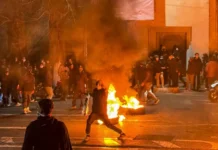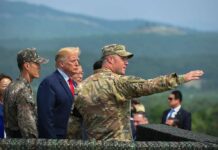Build workers’ resistance and a socialist alternative
Marcus Kollbrunner, Liberdade, Socialismo e Revolução (ISA in Brazil)
(This article was first published on 28 October 2025)
Argentina’s far-right President Javier Milei managed to secure an unexpected victory for his party, La Libertad Avanza (Liberty Advances) in midterm elections on Sunday, 26 October, based on polarization and help from Trump. “He had a lot of help from us. I gave him a very strong endorsement”, commented Trump.
The elections were a defeat for the ‘centre-left’ Peronists’ tactics of pacification and moderation, that failed to mobilize its voters, in spite of their recent victory against Milei in provincial elections in Buenos Aires on September 7. This month’s elections saw the lowest voter turnout since the end of the dictatorship in 1983.
Milei will try to use the result to renew attacks on workers and the poor, but the underlying economic problems are piling up, in spite of a new huge bail out directly from the US Treasury that helped temporarily postpone a new currency crisis. These attacks will be met by resistance, as we have seen in the first two years of Milei’s presidency, but the movement needs to be taken to a new level to really stop his juggernaut.
Milei assumed office at the end of 2023 and in his first year he managed to implement a series of attacks—slashing public spending, pensions, subsidies for transport, heating and electricity, as well as deregulating rent, attacking labour and democratic rights, and privatizing state enterprises like the state metal firm IMPSA.
His first year in office was also marked by resistance from below, but the Peronist-led trade union bureaucracy held back the struggle, even declaring a ‘truce’, after a successful general strike. The struggle continued this year and a new general strike was called in April. But again, it was not followed up with a plan of continued struggle and escalation to topple Milei, but rather used as an escape valve to let out the pressure. The election results show the failure of attempts to divert the struggle into “safe” electoral channels.
Milei maintained quite a high level of support in the polls last year and the beginning of this year. One important factor was that his plan to curb inflation seemed successful, with yearly inflation falling from over 200% last year to 32% in September. That was based on extreme austerity, holding back public spending and private consumption, and at the same time managing a gradual fall of the official dollar exchange rate.
After two years of falling GDP, the economy started recovering at the end of last year and in the beginning the figures looked impressive, compared with the rock bottom of 2024. There has also been a huge propaganda campaign internationally from the bourgeois press and the markets, in favour of Milei’s policies and attacks on working people, with some even claiming that Argentina would grow faster than China.
A year of problems
But 2025 has also been a year of problems for Milei. In his first year he managed to get through many of his policies, even with only a small minority of supporters in Congress, with help from part of the “opposition” and provincial governors. But this year, he has lost most votes in Congress. The recovery has started to lose steam, with GDP falling again in the second quarter and probably falling again in the third, which means that Argentina is back in recession. While still much lower than in recent years, monthly inflation increased to 2,7% in October, up from a low of 1,5% in May.
Milei also started to lose popularity after several corruption scandals. In February, he promoted a cryptocurrency that proved to be a scam. In August, allegations were made against his sister, Karina Milei, who holds a key position in the government, of taking bribes in exchange for drug contracts for medicines for disabled people. In October, José Luis Espert, Milei’s main candidate for the Buenos Aires Provincial parliament stepped down from the election after accusations of receiving money from drug traffickers.
During the year, Milei has struggled to keep Argentina’s currency, the peso, from plummeting, after an initial devaluation of 800% to bring the official rate closer to the market rate. If the peso were to lose value too quickly, this would lead to inflation increasing again, in the very dollarized economy. One of Milei’s promises in the elections was to dollarize the economy. The plan was to have a gradual devaluation, but it has been slower than inflation. This means that the peso has been increasing in value, leading to trade deficits as Argentinian goods become more expensive, but also leading to people who can afford it hoarding dollars instead of spending. The trade and current account deficit means that the only way to get dollars into the economy has been through loans. These contradictions and other problems in the economy have threatened to lead to more capital flight and a fall of the peso.
So instead of a “success story” for Argentina and Milei, what we have seen is the government having to depend on new emergency loans in order to have some reserves to defend the value of the peso. Earlier this year, the IMF agreed to a new loan of US$ 20 billion and the World Bank an additional US$ 10 billion.
But after his election defeat in provincial elections in Buenos Aires in September, when Milei’s party came almost 14% behind the Peronists, the dollar started falling again and the government was running out of reserves. That was when Trump stepped in to save his right-wing friend.
Trump props up Milei
On October 6 at the same time as Milei was staging a rock show (with himself as the star) to launch his new book, “The Construction of a Miracle”, his economy minister, Luis Caputo, was in Washington begging for a very material ‘miracle’.
The US Treasury bought pesos directly in the market and on October 20 an agreement was signed for a loan package in the form of a currency swap of US$ 20 billion, that can be expanded to US$ 40 billion. Trump said explicitly that the condition was a victory for Milei in the elections, “or we are out”.
What are US interests in Argentina? Trump has taken crony capitalism to a new level and Milei has been one of his strongest supporters and political allies. South America is also an important theatre for competition with China over influence. “We are sticking with a lot of the countries in South America. We focus very much on South America,” said Trump when commenting on the elections.
In 2020, Argentina arranged an $18 billion currency swap with China, $5 billion of which Argentina activated in 2024 and renewed in 2025, in spite of Milei calling China an “assassin state” during his presidential campaign. So, the idea is to replace China’s help with US dollars.
There is also a dispute over trade relations, which also shows that Trump’s policies are contradictory, and that he is ready to sell out anyone that supports him. Trump says that he plans to quadruple Argentina’s quota for low tariff beef imports, to try to get beef prices down, and to help his buddy. That has led to complaints from US farmers. Argentina has also been an alternative source of soybeans for China, which used to buy a lot from the US.
Argentina also has important natural resources. The Vaca Muerta formation is the world’s second-largest reserve of shale gas and fourth-largest of shale oil. Argentina also has 20% of the world’s known lithium reserves, which is critical for electric vehicles and battery storage.
As usual with Trump, the strategic interests are also linked to more personal ones. Paul Krugman has reported how hedge fund managers, friends of US Secretary of Treasury Scott Bessent, were getting nervous about losing money they invested in Argentina. So, the loan to ‘help’ Argentina also has the nice perk of helping make sure there are sufficient dollars to finance their capital flight!
Ultimately, all that Milei has managed is to buy some time. None of the fundamental economic problems are solved and the external debt is a ticking bomb. Argentina ended the second quarter with the biggest external debt ever, US$ 305 billion, of which US$ 55 billion is to the IMF.
The markets, the IMF and Trump will expect Milei to step up the attacks with privatizations, cuts and dismantling labour rights, which he gladly will do. He still does not have a majority in Congress, but now has over a third of the seats, which gives him the power to stop Congress from overturning his vetoes.
But there will be resistance from workers and youth, as we have seen throughout his presidency. In that sense, a positive outcome from the elections was the almost 900,000 votes for FITU, the “Workers Left Front — Unity”, which won three seats in the lower house and 9,1% in Buenos Aires city, making it the third largest political force in the capital and the province. However, FIT-U still has difficulty in being an effective force beyond an electoral alliance, having a real impact in the struggles. The challenge for socialists is to build a movement that can free the struggle from the suffocating grip of the Peronist trade union bureaucracy, armed with a socialist program to overcome the crisis ridden Argentinian capitalism, as a step in building a powerful Latin American socialist alternative.




